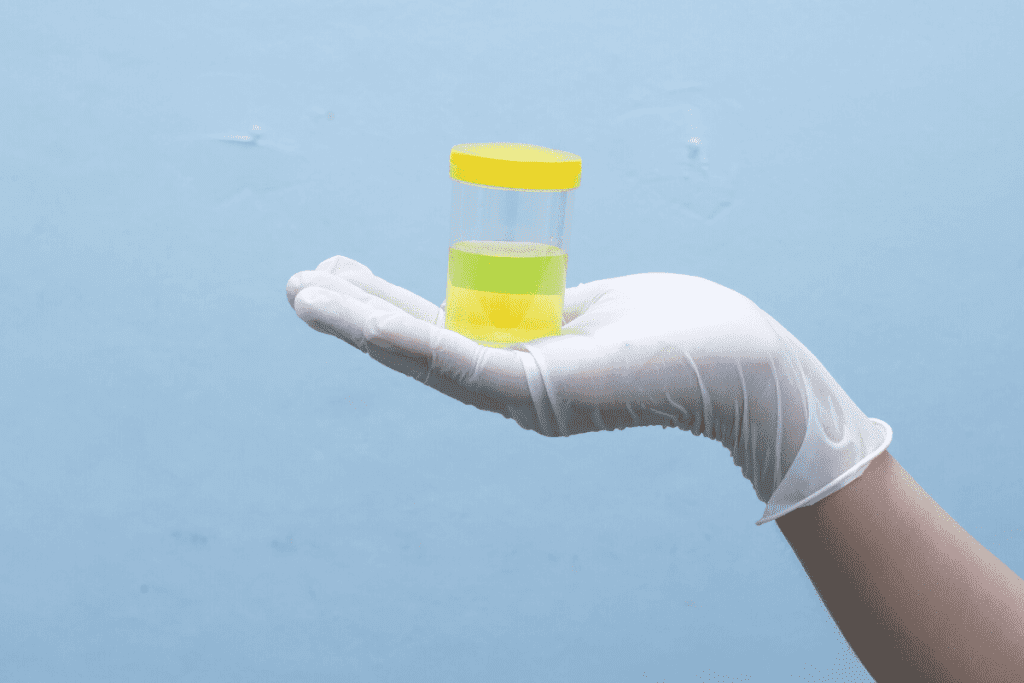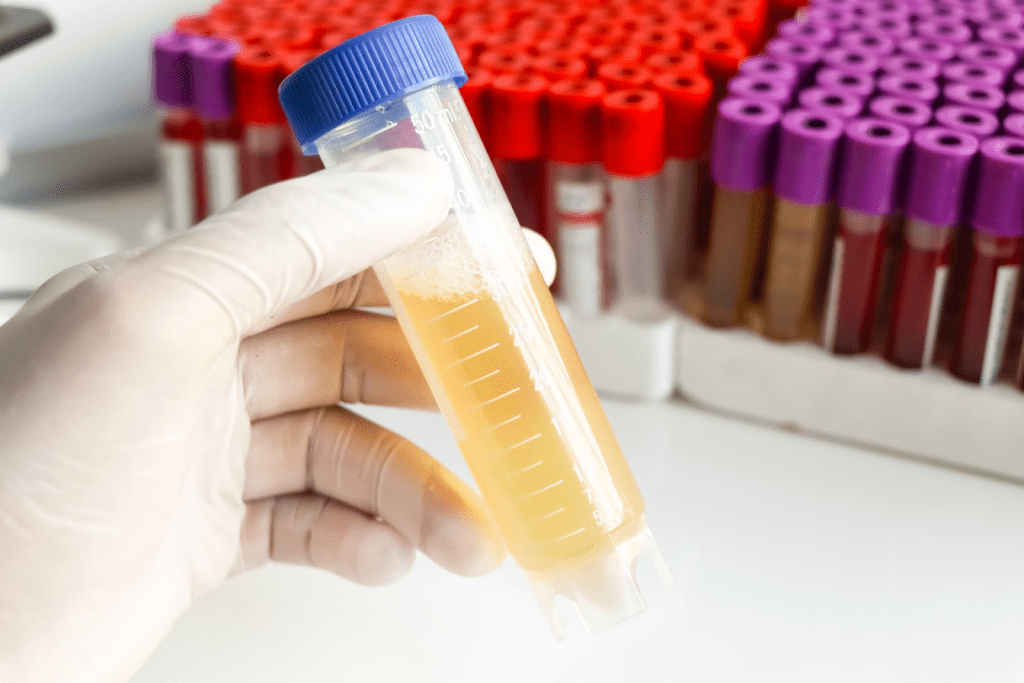Last Updated on November 25, 2025 by
Drinking enough water is key to our bodies working properly. Many wonder if drinking a lot of water can dilute urine. We’ll look into how water intake affects urine concentration and what studies say about drinking 2 liters of water.

Studies show that drinking 2.5-3.5 liters of water a day can lead to 2-3 liters of dilute urine. Drinking 2 liters of water in a short time can really change how concentrated our urine is. This makes us think about how much water we drink and its effects on urine tests and our health.
Our kidneys are key to keeping our body balanced. They filter blood and control urine concentration. This process removes waste and excess substances from our blood, turning them into urine.

The kidneys filter blood through tiny units called nephrons. Inside each nephron, a glomerulus filters blood. It lets small molecules like water and ions pass through, but keeps bigger molecules like proteins in the blood.
After filtering, the mixture moves through the renal tubules. Here, nutrients are taken back into the blood, and waste is concentrated. This balance is vital for our body’s fluid and electrolyte levels.
Normal urine is clear or pale yellow and has a pH between 4.6 and 8.0. It’s made of water, urea, creatinine, and waste products. The amount of these substances changes based on how much we drink and eat.
Many things can change urine composition. For example, diabetes can add glucose to urine. Infections can also alter urine smell or color.
Several things can change urine concentration. Drinking more water makes urine more diluted. Being dehydrated makes urine more concentrated to save water.
Medications and health issues can also affect urine concentration. Diuretics, for instance, increase urine production, making it more diluted. Knowing these factors helps understand urine test results, including drug tests and dilution urine concerns.
When it comes to how much urine is needed for a drug test, the amount varies. It depends on the test and what’s being tested for. A good urine sample is needed for accurate results.

It’s important to know when urine is diluted. This is key for health tests and drug screenings. We’ll look at how to spot diluted urine and how labs check its concentration.
Diluted urine shows up in a few ways. Color is a big clue; it’s usually yellow. But diluted urine is clearer or pale yellow. The odor is another sign; concentrated urine smells stronger, while diluted urine smells milder.
Chemical signs include certain substances in the urine. For example, creatinine levels help figure out urine concentration. Creatinine is a waste from muscle breakdown. Labs check for it to see if the urine is diluted.
Labs use specific gravity to check urine concentration. It compares urine density to water. Normal urine has a specific gravity between 1.015 and 1.030. Diluted urine is closer to 1.000, like water.
Creatinine levels are also key. Low levels mean urine is diluted. Labs test both specific gravity and creatinine to understand urine concentration.
Labs also look for other signs of diluted urine. They test for other waste products and check urine composition. Advanced tests can spot tampering or natural dilution.
Knowing these signs and tests is vital for accurate medical results. Whether it’s a drug test or health check, spotting diluted urine helps doctors make better choices.
Drinking 2 liters of water can change how concentrated your urine is. Our body adjusts urine concentration when we drink a lot of water. This helps keep us hydrated and healthy.
Studies have looked into what happens when we drink 2 liters of water. They found that urine gets less concentrated in just a few hours. This is because our kidneys work to remove the extra water.
One study showed that drinking 2 liters of water lowers urine specific gravity. This change happens in 2-3 hours. It shows how fast our kidneys respond to more water.
How fast urine dilutes after drinking 2 liters of water varies. Usually, our kidneys start working on it within 30 minutes to 1 hour. Urine gets most diluted around 2-3 hours later.
Many things can change how we dilute urine. Our health, how hydrated we are, and kidney function play big roles. For example, someone with healthy kidneys might process water faster than someone with kidney problems.
Many factors can change how our body reacts to 2 liters of water. These include:
Knowing these factors helps us understand the effects of 2-liter water on urine. If you’re worried about water intake and urine, talk to a doctor.
Knowing if your urine is diluted is key to many medical tests. Diluted urine can mess up test results. So, it’s important to know how to spot it.
One easy way to check if your urine is diluted is by looking at its color and how clear it is. Usually, urine is yellow or amber. If it’s diluted, it will be clear or pale yellow. This happens because diluted urine has more water, making it less concentrated.
Another sign of diluted urine is how often you pee. Drinking lots of water can make you pee more. This is because your body is getting rid of more fluids, leading to diluted urine.
There are ways to check if your urine is diluted at home. You can use urine test strips to see the specific gravity of your urine. This shows how concentrated it is. Also, diluted urine usually smells milder.
Healthcare pros use lab tests to check creatinine levels and specific gravity in urine. These tests show if your urine is diluted. If you’re worried about your urine test, talking to a doctor is a good idea.
By watching these signs, you can tell if your urine is diluted. This is helpful if you’re getting ready for a urine test. Knowing these signs can help you get better results.
Drug tests have special ways to spot diluted urine. This is key to keeping the testing fair. Labs use different methods to find and deal with diluted samples. This is important for getting the right test results.
Labs use advanced tests to check urine samples. First, they do initial tests. Then, they do more tests if the first one shows something.
Critical Measurements:
These tests check if the urine is diluted. For example, creatinine levels show how thick the urine is. If the creatinine is low, it might mean the urine is diluted.
Creatinine and specific gravity are important for checking urine concentration. Creatinine is a waste product from the kidneys. Its level in urine shows if it’s diluted. Specific gravity checks how dense the urine is compared to water. Normal urine is between 1.010 and 1.030.
Knowing these measurements helps understand drug test results.
A “negative dilute” result means the test can’t find drugs because the urine is too diluted. Even though it’s negative, the person might have to take the test again.
The effects of a “negative dilute” result depend on where the test was done. It’s important to know it’s not the same as a true negative result. A “negative dilute” suggests tampering or too much water.
If a urine sample is too diluted, labs start retesting. They might:
These steps help make sure the drug tests are fair and accurate.
Urine can become diluted in many ways. This happens due to drinking too much water, medical conditions, or certain medications. Knowing these reasons can help you prepare for urine tests.
People getting ready for a job might drink too much water. This can happen the night before or the morning of a drug test. If you’ve wondered about drinking too much water before a test, you’re not alone.
Patients getting ready for tests might also have diluted urine. Tests often require fasting or avoiding certain foods. But drinking too much water can also cause it. Always follow your doctor’s advice to avoid problems.
Athletes need to stay hydrated, but can overdo it. Drinking too much water during long workouts or in hot weather can dilute urine. It’s important for athletes to find the right balance for urine tests.
Some drugs and supplements can change urine concentration. Diuretics, for example, make you pee more, which can dilute urine. Herbal supplements can also have this effect. If you’re worried, talk to your doctor.
Other things can also make urine dilute, like certain health conditions. Knowing these can help you understand urine test results better.
In short, diluted urine can happen in many situations, from job tests to sports training. Being aware and taking steps can help make urine samples accurate.
Drinking too much water can be harmful. It’s often done to avoid drug tests or to “cleanse” the body. But it can cause serious health problems. We’ll look at the dangers of overhydration and how to stay hydrated safely.
Too much water can cause water intoxication. This happens when the body can’t handle all the water, leading to an imbalance of electrolytes. This imbalance can result in hyponatremia, a dangerous condition with low sodium levels in the blood. It can be deadly if not treated quickly.
It’s important to know the signs of overhydration. These include:
If you or someone you know has these symptoms after drinking a lot of water, get medical help right away.
To stay hydrated without harming yourself, drink water in moderation. Aim for at least eight glasses of water a day. But, this can change based on your activity level, climate, and individual needs. Listen to your body and drink when you’re thirsty, not because you have to.
If you’re worried about your water intake or have symptoms of overhydration, see a doctor. They can give you advice tailored to your health. Also, if you’re worried about a drug test or urine dilution, talk to a doctor. They can help you stay safe.
Intentional urine dilution is a big deal in many areas, like work and sports. It’s important to look at the laws, the effects, and the big picture of this practice.
Many groups have strict rules for urine tests. For example, the Substance Abuse and Mental Health Services Administration (SAMHSA) has rules for drug tests at work in the U.S. They check things like creatinine levels and specific gravity to see if a sample is diluted.
Places that do urine tests have to follow these rules closely. They check the urine’s temperature, pH, and more to make sure it’s real.
At work, trying to dilute urine can lead to big problems. If a test shows the urine is diluted, it might be seen as a failed test. This could mean getting fired.
For jobs where safety is key, like driving or building, a diluted test might mean you have to take another test or even get suspended right away.
In sports, the rules against doping are very strict. The World Anti-Doping Agency (WADA) has rules to catch and stop doping, including diluting urine.
If an athlete is caught with diluted urine, they could face serious penalties. This could include being banned from competing, which can hurt their career and reputation.
Intentional urine dilution can also have big effects outside of work and sports. If someone tries to cheat a medical test, they could face legal trouble. This could include fines or other penalties.
Also, diluting urine can hide health problems. This could lead to not getting the right treatment or diagnosis. Doctors need to know about this to give the right care.
Looking at urine dilution shows us how important laws and ethics are. It’s key for everyone to understand these issues to make good choices and follow the rules.
Many people don’t understand how water affects drug test results. This leads to a lot of wrong information online. Those trying to pass drug tests often find this confusing.
Some think drinking lots of water can hide drug use. But drug tests can spot this trick by checking urine concentration. Others believe certain products can change test results, but most of these claims are not true.
Drinking a lot of water before a test is thought to help pass by diluting urine. But this can cause water intoxication, a serious condition.
Online tips are often based on stories, not science. But research shows that too much water doesn’t always mean a clean test.
It’s key to drink the right amount of water. Adequate hydration keeps the body healthy and working properly. The goal is to stay hydrated, not to cheat on a test.
Some try to cheat by drinking diuretics or too much water. This can cause hyponatremia, a serious condition where sodium levels drop too low.
Trying to cheat drug tests is risky. Instead, focus on real ways to prepare, like not using drugs and living a healthy life.
It’s important to know how water intake and urine dilution work together for good health. This is true for people who get kidney stones or are taking drug tests. Drinking a lot of water can make urine less concentrated, which affects our health.
Studies show that drinking more than 2 liters of water a day can lower the risk of kidney stones. Drinking over 2.5 liters a day and making sure you pee 2 liters can also stop stones from coming back. A study on the National Center for Biotechnology Information website found that doubling urine volume cuts down on kidney stone crystals.
We’ve looked at how drinking water changes urine concentration and what signs of diluted urine are. We’ve also talked about the dangers of drinking too much water. Knowing this helps people control their water intake for better health and accurate medical tests.
Drinking 2 liters of water can make your urine more diluted. But how much it dilutes depends on your health, how hydrated you are, and your kidneys.
A urine drug test usually shows if you’ve taken a substance, not how much. But some tests can tell you the substance’s concentration in your urine.
Drinking too much water before a test can make your urine too diluted. This might lead to a “negative dilute” test result. You might need to take the test again.
To pass a urine test, follow the guidelines and avoid substances that can be detected. It’s important to stay hydrated but not drink too much water to avoid diluted urine.
Diluted urine has low specific gravity and creatinine levels. This means it’s too watery. Labs use these markers to check urine concentration.
The urine needed for a drug test varies. But usually, you need at least 30-45 mL.
Getting a negative dilute drug test result is common. This often happens if you drank too much water before the test.
No, adding water to your urine test is tampering. It can cause your test to fail or even lead to legal trouble.
Drinking too much water can cause water intoxication and hyponatremia. These are serious conditions that can be life-threatening. Always drink water safely.
Check if your urine is diluted by looking at its color and clarity. Also, notice how often you urinate. You can use at-home tests or get a professional assessment.
Subscribe to our e-newsletter to stay informed about the latest innovations in the world of health and exclusive offers!